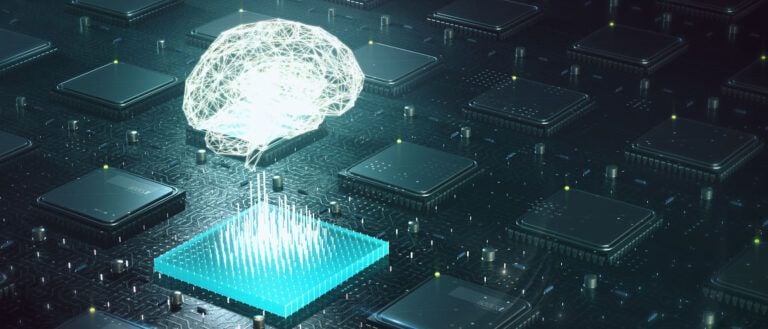Open Source AI: 10 Game-Changing Tools for Intelligent System Development

- What is Open Source AI and How Does it Differ From Proprietary AI Systems?
- How Does Open Source AI Contribute to Faster and More Collaborative Development of Intelligent Systems?
- 10 Popular Open Source AI Frameworks and Tools Available for Developers
- How Has Open Source AI Transformed Industries?
- What are Open Source AI’s Potential Challenges and Limitations in Building Intelligent Systems?
- How Can Emeritus AI and ML Courses Give a Competitive Advantage in the Digital Era?
Open source AI has emerged as a key driver in the digital era, with its potential to revolutionize industries. This powerful tool transforms how intelligent systems are developed, thereby shaping the future of various industries. A 2022 McKinsey report states that the proportion of companies adopting Artificial Intelligence (AI) in 2022 was double that in 2017. Moreover, businesses adopting AI say they have realized meaningful cost decreases and revenue increases. With this in mind, let’s explore the world of open source AI, its impact on the development of intelligent systems, and how it is disrupting and reshaping various industries.
What is Open Source AI and How Does it Differ From Proprietary AI Systems?
 Open source AI refers to AI software whose source code is freely available for modification and enhancement by anyone. This starkly contrasts with proprietary AI systems, where the source code is kept secret and controlled by the company that developed it. The open nature of open source AI fosters a collaborative environment, enabling developers worldwide to contribute. This results in the acceleration of innovation and development.
Open source AI refers to AI software whose source code is freely available for modification and enhancement by anyone. This starkly contrasts with proprietary AI systems, where the source code is kept secret and controlled by the company that developed it. The open nature of open source AI fosters a collaborative environment, enabling developers worldwide to contribute. This results in the acceleration of innovation and development.
How Does Open Source AI Contribute to Faster and More Collaborative Development of Intelligent Systems?
Open source AI is a significant catalyst in intelligent systems’ rapid and collaborative development. Its democratizing nature has opened up opportunities for developers across the globe, regardless of their affiliation with large corporations or research institutions. Here are three ways open source AI is accelerating the development of intelligent systems:
Provides Readily Available Frameworks
One of the primary ways open source AI contributes to faster development is by providing readily available frameworks and tools. These resources eliminate the need to build systems from the ground up, saving developers considerable time and effort. They can instead focus on refining and customizing these tools to suit their specific project requirements, thereby accelerating the development process.
Harnesses a Collaborative Process
Open source AI promotes a collaborative environment. Moreover, developers can contribute to the code, suggest improvements, and share unique solutions to common problems. This collaborative approach not only speeds up problem-solving but also creates more robust and efficient systems. It is a global brainstorming session where the best minds in AI work together to push the boundaries of what is possible.
Encourages Continuous Learning
Additionally, open source AI encourages continuous learning and improvement. The entire community benefits as developers from diverse backgrounds contribute their knowledge and skills. Moreover, they can learn from each other’s successes and failures, leading to a rapid iteration of ideas and faster advancement in AI technologies.
ALSO READ: What’s the Fate of AI in 2023? 8 Pathbreaking Technology Trends
10 Popular Open Source AI Frameworks and Tools Available for Developers
There are numerous open source AI frameworks and tools that developers can use. Some of the most popular ones are:
1. TensorFlow: A Robust Framework for Neural Networks
Starting with TensorFlow, this comprehensive open source AI platform developed by Google, is a popular choice for developers building neural networks. Notably, this platform supports several programming languages, including Python and JavaScript, making it highly versatile. Furthermore, TensorFlow’s extensive support structure and training resources make it an excellent starting point for AI development.
2. PyTorch: A Preferred Choice for Machine Learning
This user-friendly platform—developed by Facebook’s AI Research lab—supports the development of various AI projects, particularly in machine learning. Importantly, PyTorch’s object-oriented approach allows developers to bundle up usable chunks of code, thereby facilitating efficient and collaborative development.
3. Keras: Simplifying Interaction With AI Models
Next up is Keras, another open source AI tool designed with user-friendliness in mind. Specifically, an Application Programming Interface (API) allows developers to share the front-end of their deep learning models quickly and easily. Moreover, Keras focuses on artificial neural networks and is best suited for programmers who prefer a more streamlined user interface.
4. OpenAI: Pioneering in Natural Language Processing
The OpenAI platform has been making waves in Natural Language Processing (NLP). Its model, Codex, can transform natural language into code in the programming language you specify. OpenAI’s models are also open to the public for customization, making it a highly collaborative platform.
5. OpenCV: Mastering AI Vision
This renowned open source AI platform specializes in computer vision. Suppose you’re developing AI specifically for computer vision applications. In that case, OpenCV is the tool for you: Remarkably, its library, written in C, can be ported to a wide range of platforms, making it highly versatile.
6. H2O.ai: Accelerating AI Development
Shifting to H2O.ai, this platform claims to be the fastest, most accurate AI platform on the planet. It aims to democratize AI by making it accessible to anyone, empowering humanity to use it to impact the world positively. Consequently, H2O.ai is a solid choice for companies that prioritize development speed and plan to use AI to enhance their offerings.
7. Rasa: Building Conversational AI
This is an excellent tool for building conversational AI, such as chatbots, and is designed to be future-proof. This means you can plug any NLP or ML model into Rasa to yield increasingly accurate results as technology improves.
8. Amazon Web Services (AWS): A Familiar Place to Start Building
Amazon Web Services (AWS) is a familiar platform for many developers. It allows you to run your code and store the results/output of your programs. AWS also offers numerous value-added features for business marketing, making it a comprehensive tool for AI development.
9. GitHub: Keeping Collaborative Work Orderly
Reflecting on GitHub, this platform keeps collaborative work orderly. As the biggest name in programming cooperation, it helps to organize projects when many hands touch the same code. Therefore, GitHub is essential for individuals or teams working productively on a project.
10. Scikit-Learn: A Simple Tool for Predictive Data Analysis
Lastly, Scikit-learn is a powerful open-source tool for machine learning and predictive data analysis, built on Python libraries like NumPy and SciPy. It offers a variety of supervised and unsupervised learning algorithms for tasks such as classification, regression, clustering, dimensionality reduction, and feature extraction.
ALSO READ: AI for Coding: A Guide on How to Navigate the Future of Programming
How Has Open Source AI Transformed Industries?
1. Healthcare
Open source AI has revolutionized healthcare by enabling accurate disease diagnosis through predictive models. It has also facilitated personalized treatment plans, improving patient outcomes and streamlining healthcare delivery.
2. Finance
This software technology has been pivotal in finance risk assessment, fraud detection, and algorithmic trading. Moreover, AI algorithms analyze financial data for patterns and trends, enabling accurate risk assessments and fraud detection. Furthermore, AI-driven trading systems execute trades at high speeds, maximizing profitability.
3. Manufacturing
In manufacturing, open source AI has been beneficial in predictive maintenance and supply chain management. AI can forecast equipment failures, reduce downtime, and optimize the supply chain by predicting demand and streamlining logistics, thereby enhancing operational efficiency.
ALSO READ: How Top Applications of AI are Transforming Different Sectors
What are Open Source AI’s Potential Challenges and Limitations in Building Intelligent Systems?
 While open source AI brings many benefits, it also presents challenges.
While open source AI brings many benefits, it also presents challenges.
Data privacy and security are significant concerns, as these systems often require access to vast, potentially sensitive data, necessitating robust safeguards.
Secondly, despite the collective input, the quality and reliability of open source code can vary, requiring users to have technical expertise for effective evaluation, modification, and implementation.
Lastly, bias in AI systems leading to unfair outcomes is a growing concern. Therefore, using diverse and representative data for training AI systems is crucial.
How Can Emeritus AI and ML Courses Give a Competitive Advantage in the Digital Era?
In the fast-changing digital landscape, staying current with the latest trends and technologies is crucial for a competitive edge. Emeritus offers comprehensive and up-to-date online AI and ML courses that equip you with the skills to leverage open source AI effectively. By applying these technologies, individuals and organizations can drive innovation and stay at the forefront of their industries. You can start your learning journey by enrolling in Emeritus’ artificial intelligence and machine learning courses, thereby elevating your AI and ML skills to the next level.
Write to us at content@emeritus.org
















